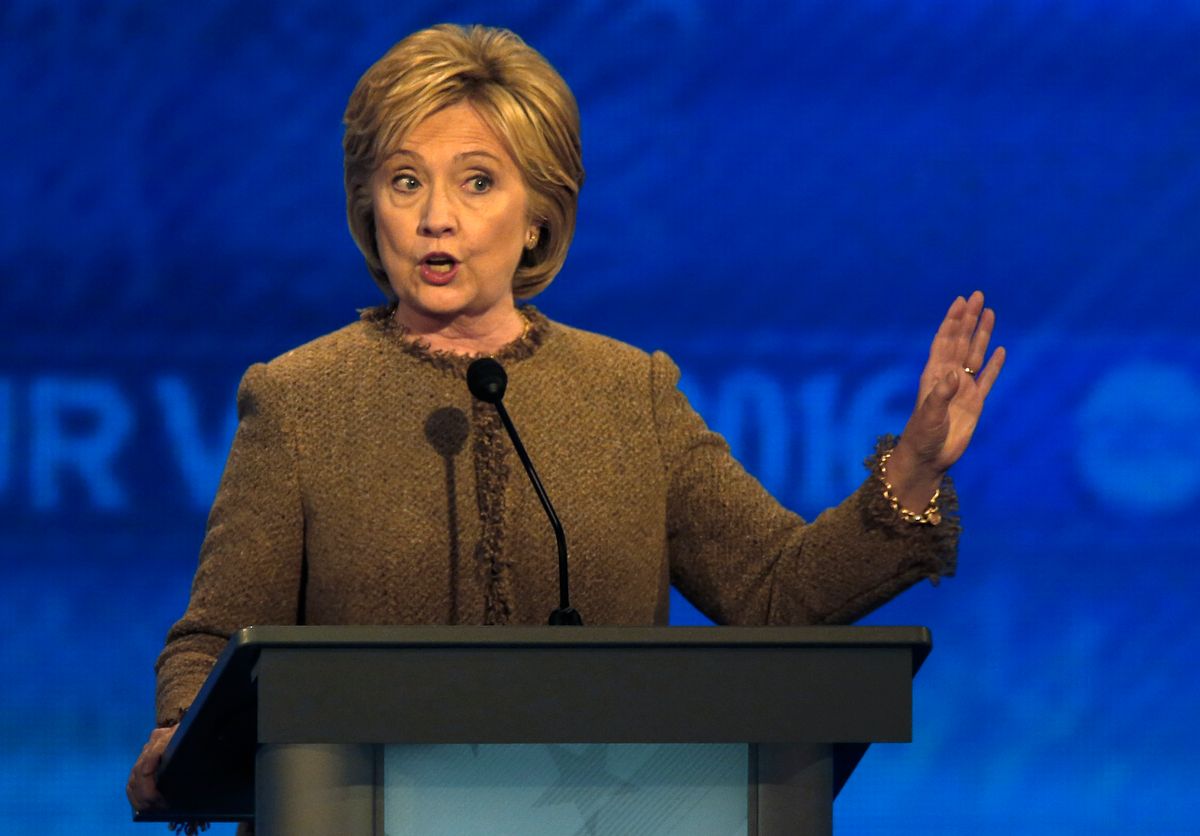Hanging over every second of Saturday night's Democratic presidential debate was one persistent question: Why, exactly, was it being held on the Saturday night before Christmas?
Whether to protect Hillary Clinton—a very capable debater who certainly does not need protecting—or for some other obscure reason, the Democratic Party has decided to hide their candidates as much as possible from the voters. (The next debate is on the Sunday before Martin Luther King Day.) Apart from the annoyance of having to tune in on a Saturday, it's a baffling ceding of ground to Republicans, whose ever-escalating racism has been given a gigantic public platform.
Possibly Clinton doesn't mind. She's got her eyes squarely focused on the general election, not the primary. She sailed through the debate mostly unruffled; she was loose and supremely confident, as befits a campaign that she is bound to win. Bernie Sanders is not a real threat to her, which meant that she could comfortably run well to his right. Her hawkishness is deeply ingrained in her—we recently learned that she talks to the same foreign policy people that Marco Rubio and Ted Cruz do—so it was no surprise that she objected when Sanders wondered aloud if she was too eager to intervene in other countries. "If the United States does not lead, there is not another leader!" she said forcefully. "There is a vacuum." Her defense of the disastrous invasion of Libya was muddled and unconvincing, but it's not an issue that's going to cause her any trouble.
Clinton also, rather shamefully, protected her right flank by casting Sanders' call for single payer health care as a budget-busting middle class tax hike. Only the experience of every industrialized country in the world contradicts this narrative. It's an extremely well-known fact that single payer is vastly cheaper than the American system. But Clinton clearly thinks it's more important to say that she won't raise middle class taxes than to tell the truth about this issue. (Her definition of what constitutes the middle class, by the way, is a strange one.) Sanders pointed out that, on that basis, Clinton wouldn't support Social Security, Medicare or even the $1.38/week increase to the payroll tax that a bill in the Senate would require to fund paid family leave.
Sanders has become more fluent on foreign policy, though the relative conventionality of some of his views—such as his extended mash note to Jordan's King Abdullah—shines through on these occasions. And his framing of Donald Trump's popularity as a divide-and-rule subduing of the working class was about as concise a summation of his general outlook as you're likely to get. Sanders is never anything less than himself on these occasions. You know what you're going to see, and he delivers. He's leading in New Hampshire and clearly has no appetite for a scorched-earth fight with Clinton; this campaign has probably already exceeded his wildest fantasies about what he could accomplish.
Martin O'Malley was also on the stage. He tried desperately, desperately hard to cut through. He bellowed and insulted his rivals, he had 12 ready-made personal anecdotes, and none of it worked. In a different world—one where, say, Bernie Sanders wasn't occupying all of the anti-Clinton space—O'Malley might have a chance. But Sanders is, so O'Malley doesn't. He also has the unctuous, oily air of a used-car salesman you just know is trying to fleece you. His high point probably came during the fleeting period when the debate resumed but Clinton hadn't returned to the stage. For a brief, shining second, O'Malley found himself in the top two. Then Clinton came back, and the dream was dead. Back to Maryland, Governor!
There was also the matter of what didn't make it to the table at the debate. Yet again, climate change was left out of the conversation. So were topics like reproductive rights and immigration—both key issues for the Democratic base. Race and policing was confined to one question about the widely debunked "Ferguson Effect."
Instead, we seem trapped in a blunt, two-track version of politics right now: "foreign policy and national security"—meaning ISIS, ISIS and more ISIS—the economy, and virtually nothing else. Since whoever is the next president will have to deal with many more problems than just those two, it would be nice to hear what the candidates have to say about them.
Note: the debate aired on ABC News; I also work for Fusion, which is co-owned by ABC.

Shares